Cinema Pathways
Plan Your Path in Cinema
Whether you’re here to launch your filmmaking career or take your first creative leap, LACC’s Cinema program offers a path that fits your goals, timeline, and budget.
Explore certificates and degrees that teach the art and craft of storytelling—behind the camera, in the editing bay, and across every phase of production. From quick-start certificates to a full associate degree, each program includes a semester-by-semester guide so you can stay on track from day one.
Not sure where to begin? Start by choosing a goal below:
-
🎓 Earn a degree and transfer to a university
-
🎥 Get certified in a specific filmmaking skill
-
⏱️ Finish quickly with a low-unit certificate
Scroll down to see all program options—and the exact courses to take, semester by semester.
Build Your Foundation, Shape Your Future
Whether you're heading straight into the industry or planning to transfer, our Associate degrees give you the skills, support, and creative edge to take that next big step.
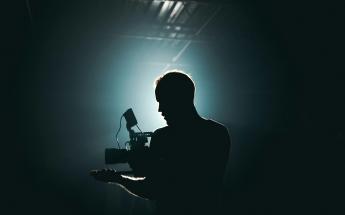
Film, Television, and Electronic Media
Associate in Science for Transfer
Launch your film or TV career with a degree that gets you on set and into a CSU. You'll study the art of storytelling, get hands-on with pro gear, and build a reel that opens doors. Complete the required coursework and you’ll be ready to transfer with confidence.
Film, TV & Electronic Media A.S. Transfer Degree Roadmap
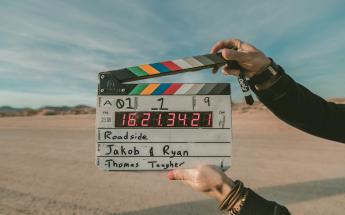
Cinema Production
Associate in Arts
LACC’s Associate of Arts in Cinema/TV sets you up for success—whether you’re jumping straight into production or transferring later on. With top-tier training, hands-on experience, and direct ties to the Hollywood industry, you’ll be ready to work as a filmmaker, editor, sound designer, or anything in between.
Cinema Production A.A. Degree Roadmap
Skill Up. Stand Out. Get Hired.
Jump into the industry with focused, hands-on training. Our certificate programs are designed to get you job-ready fast—with the tools pros actually use.
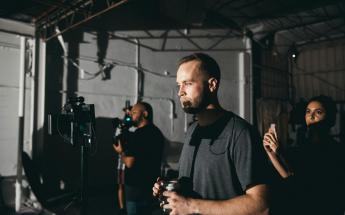
Cinema Directing
Certificate of Achievement
Step into the director’s chair and bring stories to life. This certificate trains you in the art of directing for single-camera film productions—from script to screen, working hands-on with actors and crews. Whether you're aiming to direct films or move into producing for TV, this program sets you up with the skills to lead.
Cinema Directing Certificate Roadmap
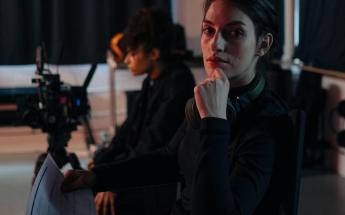
Cinema Producing
Certificate of Achievement
Learn what it takes to get a project off the ground—and across the finish line. This certificate dives into producing for film, TV, and digital platforms, covering everything from writing and budgeting to managing crews and navigating the business. You'll graduate ready to lead productions and bring big ideas to life.
Cinema Producing Certificate Roadmap
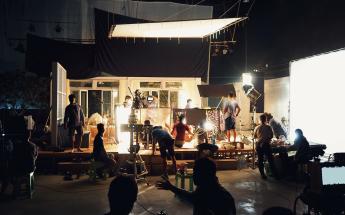
Cinema Production
Certificate of Achievement
This is your all-access pass to the world of filmmaking. Through hands-on training and mentorship, you’ll gain the creative and technical skills to work in every stage of production, from pre to post. You’ll study film history, master industry tools, and build real experience on set. Students who complete the program are prepared for careers as producers, directors, cinematographers, editors, and more.
Cinema Production Certificate Roadmap

Cinema/Video Production
Certificate of Achievement
Get fully trained in every phase of production, from planning and shooting to editing and finishing. This certificate offers expert instruction in both single- and multi-camera film and TV production, giving you hands-on experience with the tools and techniques used on real sets. You'll build the creative, technical, and professional skills needed for roles like producer, writer, director, cinematographer, editor, and more.
Cinema / Video Production Certificate Roadmap
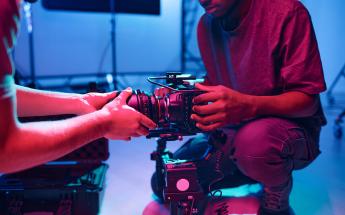
Cinematography
Certificate of Achievement
Learn to shape the visual language of film and television through hands-on training in cinematography. This certificate focuses on the technical and creative skills behind the camera, including single-camera production, lighting, camera operation, and post-production workflows. You'll gain practical experience with industry-standard equipment and develop the knowledge needed for roles such as cinematographer, camera operator, camera assistant, data manager, and colorist. Whether you're aiming to shoot on set or polish the image in post, this program sets you up with the tools to succeed.
Cinematography Certificate Roadmap

Screenwriting
Certificate of Achievement
Turn your ideas into scripts that get noticed. This certificate guides you through the full writing process, from brainstorming and outlining to completing polished screenplays for film, television, or short-form projects. You'll learn industry-standard storytelling techniques, develop your voice as a writer, and prepare to pitch your work to agents, managers, and competitions. Whether you're aiming to become a staff writer, freelancer, or content creator, this program helps you build a strong foundation in a highly competitive field.
Screenwriting Certificate Roadmap
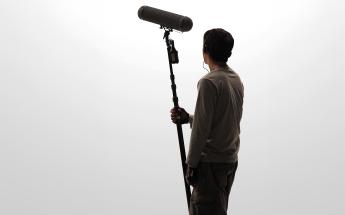
Sound for Film
Certificate of Achievement
Learn how to shape the sound that drives emotion, tension, and storytelling on screen. This certificate offers hands-on training in audio post-production, including dialogue editing, ADR, foley, and sound design. You'll build technical expertise while gaining a strong foundation in industry practices and creative collaboration. Students who complete the program are prepared for careers as sound editors, mixers, audio technicians, and designers in film, television, and digital media.
Sound for Film Certificate Roadmap

Entertainment Industry: Production Assistant
Certificate of Achievement
🔷Low Unit Certificate (9 Units)
Start your path into the film and television industry with this hands-on certificate designed to prepare you for Production Assistant roles. You'll learn on-set language, industry etiquette, and how to build a professional resumé and reel. Alongside technical skills, you’ll develop the communication and teamwork tools that keep productions running smoothly.
Entertainment Industry: Production Assistant Certificate Roadmap
Explore Every Course We Offer
Use this section to explore individual courses in the Cinema program. You’ll find descriptions, credit info, along with tips and tricks to make the most of your experience.
Introduction to Motion Picture Production
CINEMA 001 Course Description
CINEMA 001 is a comprehensive introduction to basic film and video production techniques and equipment. Students learn the proper use of cameras, lenses, filters, lights, microphones, audio recorders, editing systems, and other motion picture tools. The course also covers production planning and post-production workflows.
This class is required for all Cinema majors but is open to students of any major.
Program Planning Tip
CINEMA 001, CINEMA 002, CINEMA 003, and CINEMA 004 are prerequisites for most of the other LACC Cinema classes. We recommend that you take them all the first semester so you may continue seamlessly through the program.
Beginning Motion Picture Workshop
CINEMA 002 Course Description
CINEMA 002 is a hands-on, introductory filmmaking workshop designed to walk you through the full production cycle—scriptwriting, storyboarding, directing, cinematography, sound, and editing. Students create three original short films throughout the semester, gaining practical experience with both production and post-production workflows.
This course is required for all Cinema majors and open to all interested students. It pairs well with Cinema 001, which covers many of the technical foundations you'll apply here.
Equipment Access & Support
-
Students have access to gear from the LACC equipment room
-
Editing labs with industry-standard software are available on campus
-
While personal gear may be used, technical support is only guaranteed for department equipment
Program Planning Tip
CINEMA 001, CINEMA 002, CINEMA 003, and CINEMA 004 are prerequisites for most of the other LACC Cinema classes. We recommend that you take them all the first semester so you may continue seamlessly through the program.
The History of Motion Pictures
CINEMA 003 Course Description
Explore the rich and evolving history of motion pictures—from silent cinema to today’s blockbusters. This course focuses on the development of the American feature film, with weekly screenings and in-depth discussions that bring film history to life.
CINEMA 003 is required for all Cinema majors and open to all students.
What To Expect
-
Weekly screenings of landmark fiction films
-
Lectures and discussions on key movements, directors, and historical context
-
Written assignments and/or exams to deepen your understanding of cinema’s evolution
-
Classes held in our dedicated Morgan Freeman Theater (for in-person sections)
Program Planning Tip
CINEMA 001, CINEMA 002, CINEMA 003, and CINEMA 004 are prerequisites for most of the other LACC Cinema classes. We recommend that you take them all the first semester so you may continue seamlessly through the program.
The History of Documentary Film
CINEMA 004 Course Description
What is truth in storytelling? In this course, you’ll explore the history and evolution of documentary filmmaking—from early propaganda films to modern reality-based programming. Through screenings and discussion, you’ll analyze documentary styles including historical, animated, educational, commercial, cinéma vérité, and direct cinema.
CINEMA 004 is required for all Cinema majors and open to all students.
What To Expect
-
Screenings of landmark and experimental documentaries
-
Lectures and discussions that challenge the idea of objectivity in film
-
Written assignments and/or exams to evaluate critical thinking and comprehension
-
In-person classes are held in our Morgan Freeman Theater
Program Planning Tip
CINEMA 001, CINEMA 002, CINEMA 003, and CINEMA 004 are prerequisites for most of the other LACC Cinema classes. We recommend that you take them all the first semester so you may continue seamlessly through the program.
Introduction to Screenwriting
CINEMA 005 Course Description
This is where your stories come to life. In CINEMA 005, you'll learn the foundations of screenwriting through hands-on practice. Students will develop original short film scripts—from concept to final draft—preparing treatments, pitching ideas, and revising based on feedback. This course is a critical step toward producing your work in advanced production classes like CINEMA 033 or TV 055.
Note: Attendance is mandatory for the first class session. Enrolled students not present will be dropped. Non-enrolled students may not add if absent.
What To Expect
-
Develop and pitch your story ideas
-
Learn screenplay format and structure
-
Write, revise, and complete short film scripts
-
Prepare to produce your script in future classes
-
Collaborative peer workshops to sharpen your writing
Program Planning Tip
CINEMA 005 is the bridge between story and screen. It’s highly recommended after completing your foundational courses (CINEMA 001, CINEMA 002, CINEMA 003, and CINEMA 004). Many students shoot the scripts they develop here in future production classes.
Motion Picture Photography
CINEMA 006 Course Description
CINEMA 006 introduces students to the core principles of cinematography—framing, optics, lighting, and visual storytelling. Through individual and group projects, you’ll gain hands-on experience with professional digital cameras and lighting gear, while developing a strong foundation in the technical and aesthetic aspects of visual storytelling.
Note: Attendance is mandatory for the first class session. Enrolled students not present will be dropped. Non-enrolled students may not add if absent.
What To Expect
-
Study fundamental lighting techniques and camera theory
-
Shoot still photography exercises for critique
-
Transition into moving image exercises mid-semester
-
Use school lighting gear for in-class and on-set practice
-
Build your cinematography reel and develop a visual eye
Program Planning Tip
This class lays the technical and artistic foundation for all advanced cinematography courses. If you’re serious about becoming a Director of Photography or Gaffer, start here.
Advanced Cinematography and Creative Techniques
CINEMA 007 Course Description
Lights, camera... espionage? Okay, maybe not exactly—but in this advanced course, you’ll feel like the 007 of cinematography. CINEMA 007 explores creative and technical approaches to professional motion picture photography. You’ll work hands-on with industry-standard equipment and lighting techniques used across film and television productions.
You’ll experiment with various light sources, master both interior and exterior setups, and complete projects that demand creative precision. Expect to push beyond the basics covered in CINEMA 006 as you dive deeper into the artistry of visual storytelling.
This is a rigorous, high-level course, ideal for students serious about cinematography. Assignments include slide projects and a major cinematography exercise—completed using film or digital workflows.
What To Expect
-
Practice lighting setups in a wide range of environments and conditions
-
Use high-end equipment and industry tools
-
Work independently and collaboratively on advanced cinematography exercises
-
Shoot a major visual project in either film or digital
Beginning Motion Picture & TV Sound
CINEMA 009-1 Course Description
Get ready to tune your ears and sharpen your skills—CINEMA 009-1 is your hands-on introduction to sound for film and television. You’ll learn the fundamentals of production and post-production audio, using professional tools and techniques to capture clean, usable sound on set and in the studio.
Students will gain experience with boom operation, microphone placement, and digital field recorders, and will also explore looping, mixing, and editing sound using industry-standard software.
Whether you’re aiming to become a sound mixer, editor, or director who understands how to communicate with their sound team, this class lays the essential groundwork.
Open to all students. No prior experience required.
What To Expect
-
Operate professional audio recorders, mixers, and boom microphones
-
Practice mic placement techniques for different environments
-
Capture clean production sound on set
-
Learn post-production workflows including looping (ADR), editing, and mixing
-
Use software to clean and shape sound for your short film projects
Intermediate Motion Picture Sound and Post-Production Sound Design
CINEMA 009-2 Course Description
Ready to take your sound skills to the next level? CINEMA 009-2 dives deeper into the world of post-production audio, giving you the tools and experience to craft immersive, cinematic soundscapes. You’ll use Pro Tools™ and other industry software to shape dialogue, sound effects, and music into polished final mixes.
Beyond the technical, this class also emphasizes the creative and aesthetic side of sound design—how sound choices affect emotion, mood, and story. It’s where you learn to think like a sound designer, not just a technician.
What To Expect
-
Hands-on training in Avid Pro Tools™ and other digital audio software
-
Sound editing for dialogue, foley, ambience, and effects
-
Mixing multi-track sound sessions
-
Exploring the emotional and narrative power of sound
-
Collaborative post workflows used in real-world production
Introduction to Film Directing
CINEMA 010 Course Description
CINEMA 010 introduces students to the core principles of directing actors and staging scenes for the camera. Whether you're dreaming of directing your first short film or want a stronger grasp of performance and visual storytelling, this class is your entry point.
You’ll select a short script, cast and rehearse actors, and present your scene in class. You’ll also build a production binder that includes:
-
Script notes
-
Scene objectives
-
Character analysis
-
Shot lists
-
Storyboards
This course bridges creative vision with practical execution, helping students better communicate with performers and crew on set. It’s where you start thinking like a director—both artist and leader.
What To Expect
-
Script breakdowns and visual planning
-
Working with actors in rehearsal
-
In-class scene presentations
-
Peer feedback and group discussion
-
Developing your own directing voice
Advanced Film Directing
CINEMA 012 Course Description
This is a new course for 2025. We will be providing and updating the course description soon!
What To Expect
-
Us to update this page in the next few weeks!
Advanced Motion Picture Post-Production
CINEMA 017 Course Description
CINEMA 017 introduces students to the world of post-production finishing, with a focus on color correction, shot matching, and professional delivery workflows using industry-standard software, DaVinci Resolve.
Whether you’re a filmmaker, editor, or aspiring colorist, this course will give you the foundational tools and hands-on practice to polish your projects for theatrical, broadcast, and streaming delivery. Students will explore the creative and technical aspects of the color grading process—from balancing exposure and color temperature to establishing visual continuity and creative looks.
Through lectures, demos, and hands-on assignments, you'll learn how to:
-
Use scopes and color tools effectively
-
Match shots across scenes
-
Create a cinematic color grade
-
Understand render settings for various delivery platforms
No prior color correction experience is required.
What To Expect
-
Hands-on grading in DaVinci Resolve
-
Shot-matching exercises using professional footage
-
Intro to LUTs, node-based grading, and look development
-
Delivery formatting for theatrical, TV, and online
Introduction to Film Genres
CINEMA 018 Course Description
From westerns to horror, noir to science fiction, this course explores the foundations and evolution of major film genres. Students will examine how genres reflect culture, shape audience expectations, and influence the work of filmmakers across history. Each week features the screening and analysis of a significant feature-length film that exemplifies key characteristics of a particular genre.
You’ll investigate:
-
The visual and narrative conventions of different genres
-
How genres evolve over time
-
The role of studio systems, marketing, and audience reception
-
Influential directors and their signature contributions to genre filmmaking
Whether you're a film lover or aspiring filmmaker, this course will help you see cinema with a sharper, more analytical eye.
What To Expect
-
Weekly screenings of iconic films from different genres
-
In-class and/or online discussion and analysis
-
Exploration of studio-era Hollywood and modern reinterpretations
-
Assignments and essays focused on genre critique and comparison
-
No prior filmmaking experience required
Business of Motion Picture Production
CINEMA 020 Course Description
This course dives into the real-world business side of filmmaking—from pre-production logistics to pitching a finished package to industry professionals. Students will explore the full lifecycle of a motion picture project, including development, financing, production, and distribution.
You’ll work both individually and in teams to create a professional pre-production business package, including:
-
Treatment and short screenplay
-
Budget and production schedule using professional forms
-
Breakdown sheets and stripboards
-
Business letter and filmmaker bio
-
Storyboards and location sketches
-
A custom movie poster
-
Verbal pitch and final presentation to a guest industry panel
This is a challenging and fast-paced course designed to mirror real-world expectations in the industry. It’s an essential class for aspiring producers, directors, and filmmakers who want to take their creative work into professional territory.
What To Expect
-
Hands-on experience with budgeting and scheduling tools
-
Group collaboration and pitching practice
-
Realistic timelines and expectations
-
Final project presented to industry professionals
-
Heavily focused on pre-production planning and paperwork
Producing Motion Picture Features
CINEMA 025 Course Description
This pre-production-focused course prepares students to take a motion picture from concept to a viable project package. Learn what it takes to bring an independent feature film to life by researching and developing real-world production strategies.
Students will:
-
Develop and evaluate screenplays
-
Research current media and business trends
-
Explore independent film financing models
-
Create business plans and pitch decks
-
Understand legal issues around IP, privacy, and publicity
-
Analyze distribution formats and marketing strategies
-
Study real-world examples of both micro- and low-budget independent films
Whether you're dreaming of producing your own feature or just want to understand the bigger picture, this course provides a foundational roadmap for producers navigating today’s complex media landscape.
What To Expect
-
Emphasis on research, planning, and real-world case studies
-
Development of a full independent feature project package
-
Exploration of legal, financial, and logistical considerations
-
Individual and collaborative assignments
-
Exposure to professional contracts and industry practices
Editing Fundamentals
CINEMA 032-1 Course Description
This hands-on course introduces students to the art and craft of film and television editing. Working primarily on the Apple Mac Studio platform using Adobe Premiere Pro, students will explore both the technical and aesthetic components of editing for narrative media.
You’ll develop foundational non-linear editing skills and analyze how editing choices impact pacing, story, and emotional tone. Assignments will include cutting raw rushes from a variety of real-world projects, as well as evaluating and mimicking scenes from professionally edited films and TV shows.
This course focuses on storytelling through editing, rather than assistant editor workflows or software-specific certification.
What To Expect
-
Weekly editing exercises using Premiere Pro
-
Analysis of professionally edited scenes from film and television
-
Focus on aesthetic and narrative decision-making, not just software skills
-
Access to post-production iMac labs with Adobe Creative Suite installed
-
Feedback on pacing, rhythm, emotion, and visual storytelling
Editing Fundamentals II
CINEMA 032-2 Course Description
Take your editing skills to the next level in this advanced post-production course. Students dive into the full editorial process—building on techniques learned in Editing Fundamentals I—with a focus on visual effects, motion graphics, sound design, color correction, and project finishing.
Using both Adobe Premiere Pro and Avid Media Composer, students will gain confidence working in industry-standard tools while learning about real-world workflow practices, from ingest to final export. The course offers an opportunity to earn Avid Certified Editor credentials.
Assignments include editing instructor-provided footage and integrating personal footage for creative projects. Students will regularly screen and critique work in class to refine their editing choices and technical precision.
What To Expect
-
Advanced projects involving color grading, transitions, compositing, and more
-
Weekly in-class technique demonstrations and creative critiques
-
Industry-standard workflow using Adobe and Avid
-
Guided preparation
Digital Video Production Workshop I & II
CINEMA 033-1 & 033-2 Course Descriptions
These intermediate workshops are designed for students ready to apply their skills in a more independent, production-focused setting. Students will produce one or more short narrative or documentary-style films to serve as professional samples for festivals, portfolios, crowdfunding platforms, and more. Emphasis is placed on storytelling, creative development, and production value.
CINEMA 33-1 focuses on introducing students to the process of pre-production, directing, cinematography, and editing in a collaborative environment. In CINEMA 33-2, students dive deeper into the craft by refining their work through more complex storytelling, advanced techniques, and expanded crew roles.
What To Expect
You’ll conceptualize, pitch, plan, shoot, and edit short films with guidance and feedback from instructors. Projects can range from personal passion pieces to polished portfolio work. Collaborative teamwork is key, and students are encouraged to take on roles in each other’s projects.
Access to the department’s equipment room includes professional-grade cameras, audio gear, lighting kits, and grip equipment. Post-production is completed using our on-campus editing labs featuring Adobe Premiere Pro and other industry-standard software.
Pro Tip: We highly recommend taking CINEMA 020 – Business of Motion Picture Production before jumping into CINEMA 033. Students who take CINEMA 020 first usually come into CINEMA 033 with a solid game plan—and it shows. Their projects tend to be more developed, more organized, and often end up winning Best of Semester at the end-of-term showcase.
The Motion Picture Grip
CINEMA 038-1 Course Description
CINEMA 38-1 is a hands-on introduction to the world of professional grip work — the unsung backbone of every film set. From studio environments to rugged on-location shoots, students will master the tools and techniques used to control and shape light safely and efficiently.
Topics include:
-
Proper use of stands (C-Stands, Juniors, Babies, Overheads)
-
Flags, nets, butterflies, gels, and diffusion
-
Dolly and rigging setups
-
Set etiquette, crew roles, and staging area protocols
-
Aerial lift and ladder safety
-
Grip tools and knot tying techniques
-
Light manipulation for creative and practical effect
This course is designed to mirror the expectations and pace of a professional film set, providing real-world skills that transfer directly into the industry. Students will rotate through different roles to gain confidence in grip responsibilities, safety, and terminology.
What To Expect
You’ll be working on set—learning by doing. Most sessions take place in our sound stages or backlot-style environments using professional grip and rigging equipment. Expect to be on your feet, problem-solving, and collaborating with others as you train in one of the most critical technical crafts in filmmaking.
The Motion Picture Electric
CINEMA 038-2 Course Description
CINEMA 38-2 is a hands-on training course in set lighting and electric — the craft of powering and shaping the light behind every professional production. Students learn to operate motion picture lighting equipment safely and creatively, both in studio and on location.
Skills covered include:
-
Electrical safety and power fundamentals
-
Types of motion picture lighting (tungsten, HMI, fluorescent, LED)
-
Lighting design, objectives, and creative approaches
-
Load calculations and power distribution
-
Cables, rigging, and stands used in the electric department
-
Meters, knots, aerial lifts, and staging area management
-
Set etiquette, crew roles, and tools of the trade
Whether your goal is to become a set electrician or a cinematographer, this course provides critical insight into how lighting choices and control systems influence every frame.
What To Expect
You’ll gain hands-on experience with real-world lighting setups, working with high-output fixtures and learning how to plan and manage power on set. Expect to work collaboratively, problem-solve, and safely handle equipment under instructor guidance. Optional lab time is available to dive deeper into practical rigging and lighting strategies.
Entertainment Industry Careers, Below-the-Line Production Skills
CINEMA 060 Course Description
Break into the film and television industry with this hands-on introduction to below-the-line production skills. Whether you're aiming to be a PA (Production Assistant) or exploring other on-set roles, this course gives you the foundation to step onto a professional set with confidence.
You’ll learn how to support and collaborate with key departments:
-
Production Managers
-
Assistant Directors
-
Script Supervisors
-
Production Designers
The class also covers essential safety practices and professional etiquette that are expected on union and non-union sets alike.
What To Expect
This is a skills-based course rooted in real-world industry workflows. You’ll practice how to properly lock down a set, manage paperwork, track continuity, assist with production logistics, and support various crew positions. Expect interactive workshops, mock set exercises, and guest speakers who bring firsthand experience from working sets.
Perfect for students interested in launching their industry careers quickly, CINEMA 60 is an ideal first step toward becoming a reliable crew member — and may even help you land your first gig.
Media Aesthetics and Design for Film and Digital Media
CINEMA 501 Course Description
CINEMA 501 explores the art and language of visual storytelling across film, television, advertising, social media, and fine art. You’ll dive into the building blocks of media aesthetics — composition, color, editing, sound, and design — and examine how these elements shape meaning and emotion in both narrative and experimental works.
This course emphasizes critical analysis of form, content, genre, and ideology through a global lens, exploring national cinemas, film movements, and evolving digital landscapes. It's ideal for cinema, photography, and graphic design students, as well as anyone interested in understanding how media communicates visually.
What To Expect
You’ll learn to interpret visual media like a filmmaker — thinking beyond story and into structure, symbolism, and style. Expect dynamic lectures, film screenings, group discussions, and analytical writing assignments. Whether you're an aspiring director, editor, or designer, this course will sharpen your visual literacy and creative instincts.
Law & The Media
LAW 033 Course Description
In this essential course for anyone working in media, students explore the legal foundations that shape how content is created, distributed, and protected in the entertainment industry. Learn how the U.S. legal system intersects with film, television, journalism, and digital media — from the First Amendment to intellectual property, defamation, privacy, censorship, and more.
Whether you're a filmmaker, producer, influencer, or content creator, this course offers real-world insight into your rights and responsibilities as a media professional.
What To Expect
You’ll gain a practical understanding of the American legal system, how courts interpret media law, and the reasoning behind the rules that guide mass communication. The course is lecture-based with readings, discussions, and case studies.
